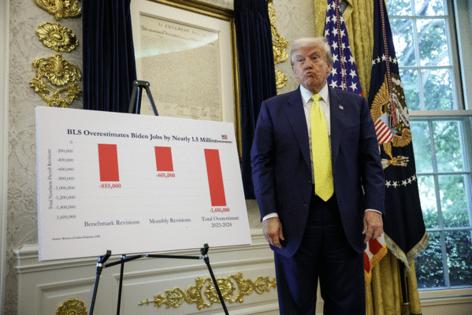Matthew Yglesias: Perfectly legal and undeniably scandalous
Published in Op Eds
One of the defining features of Donald Trump’s second presidency is an endless parade of legally dubious assaults on the foundations of American institutions. His administration’s attempt to destroy the independence of the Federal Reserve, with the director of the Federal Housing Finance Agency rummaging through private mortgage filings to gin up bad-faith charges of misconduct to create a pretext for firing a member of the Fed’s board, is only the latest example.
But there’s a popular aphorism in Washington: The scandal isn’t what’s illegal, the scandal is what’s legal. So it’s important not to let certain pernicious yet permissible Trump moves get lost in the shuffle.
Chief among these is the firing recently of Air Force Lieutenant General Jeffrey Kruse as head of the Defense Intelligence Agency. Kruse was cashiered on a Friday afternoon without so much as an explanation — similar to how the administration handled dismissals of senior military officers earlier this year.
Firing high-ranking military officers is unquestionably a legitimate exercise of presidential power, and there is certainly no legal obligation for the president or his team to explain their reasons. Still, it is highly unusual to fire commanders in this way. Unlike cabinet secretaries and other conventional political appointees who resign as a matter of course when a new president is elected, the long-established custom in the United States is for flag officers to remain in place across administrations.
Kruse appears to have been fired because the White House did not like the DIA’s assessment of the efficacy of U.S. air strikes against Iranian nuclear facilities. Again, the president is legally allowed to punish the head of an intelligence agency for reaching a conclusion that he disagrees with. But absent clear evidence of misconduct, it’s extremely unadvisable.
Intelligence work is difficult. Agencies often disagree about things in good faith. If political decision-makers start making it clear that only certain conclusions are acceptable, the quality of the work product is going to be compromised, and ultimately they will find themselves receiving bad information. And intelligence failures can blow up in spectacular ways.
Trump, of all people, should know this: The story of his rise to power cannot be told without explaining how the U.S. war in Iraq discredited George W. Bush and the Republican Party establishment even while leaving much of the basic appeal of cultural conservatism in place. Bush never did anything quite as clumsy as the outright firing of an agency head for saying the wrong thing, but his subtler modes of influence changed things for the worse. Trump’s cruder approach risks even larger disasters.
And he’s applied the same blunt approach to the transparent and staid realm of economic data. The U.S. commissioner of labor statistics is a Senate-confirmed political appointee, so Trump clearly had the authority to fire Erika McEntarfer from the job several weeks ago. In his place, he wants to install a hyper-partisan economist from the right-wing Heritage Foundation.
The propaganda upside to installing a hack at the BLS is clear enough. And it’s unquestionably legal. But this kind of move, to quote another famous saying, is worse than a crime; it’s a mistake.
It is far more important, both substantively and politically, to try to improve economic conditions rather than to try to improve economic numbers. Short of an outright recession, pretty much any situation can be seen as a glass half full or half empty. The White House usually tries to make the case for half full, while the opposition party argues for half empty. Juking the stats could give the White House a leg up — but would also make it easier for the opposition to dismiss any good news as fabrication.
A more serious issue is that reliable economic data is essential for effective economic policy.
At the beginning of former President Barack Obama’s tenure, for example, the Commerce Department’s Bureau of Economic Analysis underestimated the severity of the recession. The data were eventually revised, and it’s possible to argue that the less grim numbers made Obama look better in the moment. But long term, it was a disaster: Neither Congress nor the administration had an accurate read on the state of the U.S. economy, leading to a weaker stimulus, with dire effects for both their own political projects and American workers.
Trump’s tendency to treat disagreement as disrespect — and to conflate agreement with respect, an equally dangerous trait that was flagrantly on display at last week’s three-hour cabinet meeting — blinds both the country and himself to the possibility that things aren’t going as well as he’d like.
His firing last week of the director of the Centers for Disease Control, which bodes ill for U.S. public health, calls to mind his hostility early in the COVID-19 pandemic to the idea of widespread testing for the virus. It’s easy to forget, but long before the controversies over mask rules and school closures and vaccines, there was a prolonged period when the administration could have taken preemptive action against a virus that was then limited to China. Instead, it chose to downplay the risks.
A president is certainly within his rights to fire the head of the CDC, the DIA or the BLS. These are simply “normal” bad decisions, not ones that raise constitutional questions. But they are often consequential, and Trump’s impulses are consistently irresponsible.
____
This column reflects the personal views of the author and does not necessarily reflect the opinion of the editorial board or Bloomberg LP and its owners.
Matthew Yglesias is a columnist for Bloomberg Opinion. A co-founder of and former columnist for Vox, he writes the Slow Boring blog and newsletter. He is the author of “One Billion Americans.”
_____
©2025 Bloomberg L.P. Visit bloomberg.com/opinion. Distributed by Tribune Content Agency, LLC.
























































Comments